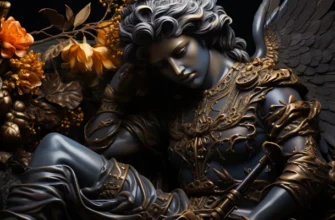Artemis is one of the most prominent and revered goddesses in ancient Greece. She played an important role in Greek mythology and was an object of worship and adoration. Artemis was the goddess of hunting, wildlife, virginity, and femininity. Her majesty, power, and beauty gave her a special status among other gods and goddesses. She possessed great strength and skill in archery, and her cult was widespread throughout Greece. Artemis remains a symbol of strength, beauty, and independence to this day, and her influence on Greek culture and art is unbeatable.
- Goddess of hunting and wildlife
- Goddess of maidenhood and femininity
- Goddess of protection and vengeance
- The story of Artemis
- The origin of her name
- Artemis as the goddess of hunting
- Symbols and attributes of Artemis
- Bow and arrows
- The moon
- Animals
- Virginity and independence
- Protector of female power
- The Amazons
Goddess of hunting and wildlife
Artemis was the goddess of hunting, controlling the hunt and possessing great strength and skill in archery. She protected wild animals and nature and was the patroness of forests, groves, and mountainous areas. Her presence indicated the connection between humans and nature and reminded people of the importance of preserving biodiversity.
Goddess of maidenhood and femininity
Artemis also played the role of goddess of maidenhood and was a symbol of purity and chastity. Her cult was associated with rites of passage for girls and recognized her as the protector of young women. Artemis was an expression of a strong and independent female essence that did not want to be subject to men and preferred to maintain her independence.
Goddess of protection and vengeance
In myths and legends, Artemis also appeared as a goddess of protection and vengeance. She could be cruel in her response to insults, especially in her dealings with those who violated her laws or dared to harm her nature or sacred places.
The cult of Artemis had a great influence on ancient Greek culture and art. She was an object of worship, and her images appeared on vases, sculptures, and other works of art. She was a source of inspiration for literature and poetry
Artemis was considered the muse of many ancient Greek writers and poets. Her myths, adventures, and qualities were embodied in literature, such as the epics of Homer and the tragedies of Aeschylus and Euripides. Legends about Artemis are embodied in poetry that glorified her greatness and power.
Artemis, as a symbol of a strong and independent woman, had a great influence on the perception of the role of women in Greek society. Her image embodied strength, independence, and willpower, which influenced the perception of women as active participants in public life and decision-making.
To this day, Artemis remains an important symbol. Her image and significance have been passed down to modern culture, finding expression in literature, art, and cinema. She continues to inspire women with her strength, independence, and ability to protect and support nature.
The story of Artemis
Artemis was born into the family of the Olympian gods. According to legend, her father was Zeus, the almighty god of Olympus, and her mother was Leto, one of the Titanides. Artemis was the twin sister of Apollo, the god of light and music.
Zeus and Leto had a complicated history, as Hera, Zeus’s wife, persecuted Leto because of her illicit relationship with him. Therefore, when Leto realized this, she sought a safe place to give birth to her children. She found refuge on the island of Delos, where Artemis and Apollo were born.
From birth, Artemis showed impressive skills in hunting and archery. She became the patroness of wild animals, forests, and mountainous areas. Her strength, skill, and devotion to nature made her an indispensable figure in ancient Greek mythology.
Artemis was a symbol of a strong and independent woman. She refused to marry and devoted her life to serving and protecting her principles. She protected virginity and promoted women’s independence, making her an important figure in the history of gender equality.
The origin of her name
The name Artemis comes from ancient Greek mythology and has its roots in the Greek language. In Greek mythology, Artemis was the goddess of hunting, wild nature, and protection, and her name reflected her characteristics and roles.
The name Artemis comes from the ancient Greek word “Ἄρτεμις,” which was pronounced “Artemis.” This word has several possible meanings, but it is most often associated with the idea of “virginity” or “untouchability.” This indicates Artemis’ patronage of virginity and her recognition as a goddess of purity and chastity.
In different regions and periods, the name Artemis can be found in different variations or combinations. For example, in the Dorian dialect, it can be pronounced as “Άρταμις” (Artamis). Variations that include names derived from Artemis, such as Artemisia or Artemidora, may also be common.
In addition to its linguistic origins, the name Artemis also acquired symbolic meaning. It became associated with powerful, independent, and protective traits, which were reflected in the goddess Artemis herself and her actions.
Artemis as the goddess of hunting
In ancient Greek mythology, Artemis is the goddess of hunting. She was an extremely skilled archer and an unrivalled hunter. Her unique skills and abilities allowed her to catch wild animals, including deer, roe deer and hares, and to track their tracks. Artemis was considered the patroness of hunters and people who depended on hunting for their survival.
As the goddess of hunting, Artemis also protected wild animals and nature as a whole. She acted as the patroness of forests, groves, and mountainous areas. Her presence indicated the importance of preserving biodiversity and balance in ecosystems.
In myths and legends, Artemis was often depicted accompanied by her companions, nymphs who faithfully served her in hunting. She also had her own loyal dogs, which helped her in searching for and catching game.
The cult of Artemis as the goddess of hunting was of great importance to ancient Greek society. People turned to her with requests for successful hunting, protection from wild animals, and gratitude for the game they had caught. Her cult also contributed to the development of ecological thinking, reminding people of the importance of caring for nature and using resources wisely.
Symbols and attributes of Artemis
Bow and arrows
One of Artemis’ most famous attributes is her bow and arrows. She was always depicted holding a bow in her hands and with arrows on her shoulder. This symbolizes her extraordinary skill in archery and hunting.
The moon
Another important symbol of Artemis is the moon. She was often called the “Goddess of the Moon” and was associated with this celestial body. The moon symbolizes her feminine power and independence, as well as reflecting her power over the night and darkness.
Animals
Artemis was also often depicted accompanied by wild animals, particularly deer or elk. These animals are her symbols and indicate her connection to nature and her role as protector of wild animals. She may also be depicted with dogs, symbolizing her role in hunting and protection.
Artemis is also associated with the image of fertile nature. She is often depicted with blooming flowers or fruits, symbolizing her influence on the growth and development of vegetation. This may also indicate her role as a goddess of health and fertility.
Virginity and independence
Artemis also symbolizes virginity and independence. She protects virginity, and her image embodies strength, independence, and devotion to her principles. This is reflected in her
Artemis also has a deep connection with nature. She is considered the patroness of forests, groves, mountains, and wild places. Her image symbolizes the natural world, its wildness and unspoiled nature. She reflects the power and beauty of nature and inspires its preservation and respect.
Protector of female power
Artemis is also a symbol of female strength, independence, and self-determination. She serves as an example of a strong and independent woman who does not succumb to traditional roles and norms. Her image inspires women to be brave, courageous, and independent.
Artemis is also associated with struggle and protection. She acts as a protector of nature, wild animals, and people in need. Her strength and confidence help her stand guard over justice and fight against negative forces.
The Amazons
Artemis is also associated with the legendary Amazons, female warriors known for their courage and independence. She acted as their patron and leading symbol. This connection emphasizes her role in protecting female strength and freedom.
All of these attributes and symbols of Artemis help to reveal her significance in ancient Greek mythology.
Conclusion
Artemis, as the goddess of maidenhood, embodies a number of important aspects in ancient Greek mythology and culture. Some of these aspects include:
Symbol of maidenhood: Artemis stands guard over maidenhood and chastity. Her image inspires respect for the values of purity and moral integrity.
Independence: Artemis represents a strong and independent woman. She renounced marriage and motherhood, choosing freedom and independence.
Protection of women’s rights: Artemis acts as a protector of virginity and a patroness of women. She encourages girls and women to self-determination, independence, and the fight for their rights.
Symbol of nature: Artemis is associated with nature, especially forests and wild animals. She is the goddess of hunting, conservation of natural resources, and interaction with the natural environment.
Artemis had a significant influence on ancient Greek culture. She was revered as the goddess of hunting, fertility, and protection. Her cult was widespread throughout Greece, and her temples and sacred sites were places of worship and religious rituals.








